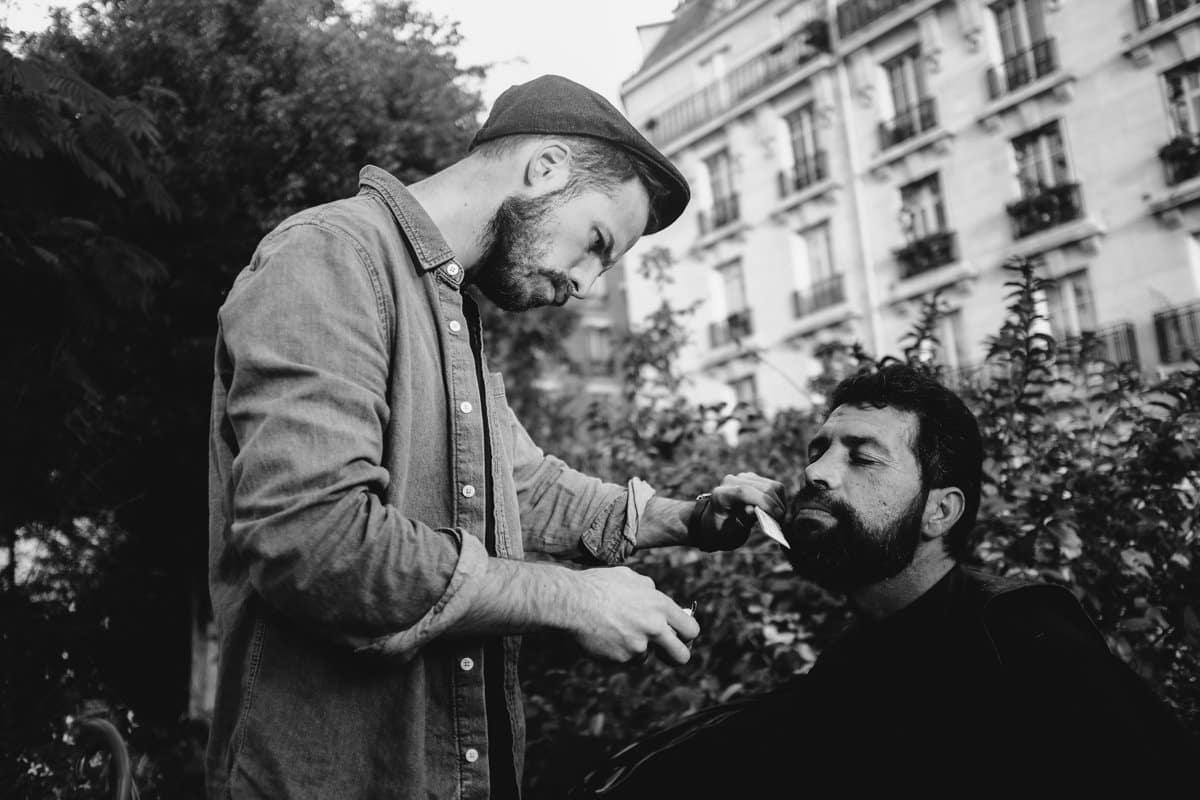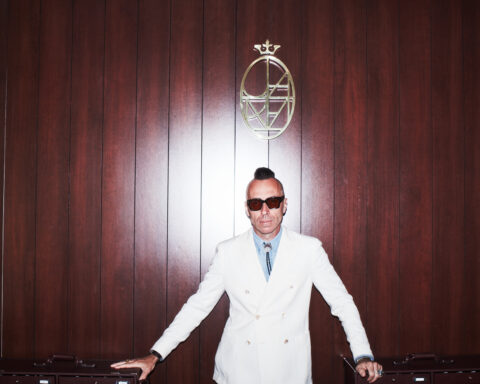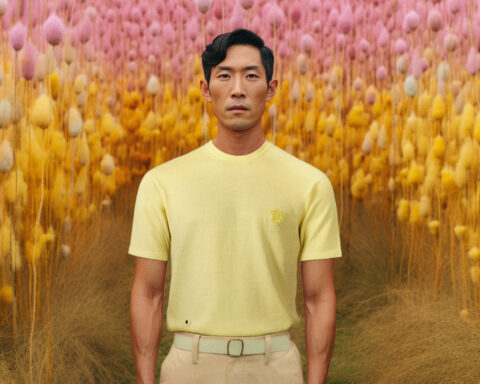In 2015, stylist Joshua Coombes gave a haircut that changed his life. It wasn’t to a celebrity, or for a fashion show, but to a homeless man he had passed many times near London Bridge. He had offered him food or a cup of coffee before, but when he cut his hair he shared something even more valuable, his time. He listened to the man’s story, and left him feeling heard, and enjoying the renewed dignity that came with his fresh trim.
“It wasn’t something I was planning, or some crusade,” he says. “It was just a chance to sit down and listen, to get to know someone a little and hear their story. I know that when I’m having a shit day, when I’ve been having a shit year, what has got me out of that is people listening to me, and giving me another vantage point on my own life.”
Over the coming weeks and months, Joshua began cutting the hair of many more men and women living on the streets of London, and began sharing their stories on Instagram. Then the following year, he quit his salon job to take his mission around the globe. He launched his #DoSomethingForNothing campaign to encourage others to share their skills with those in need, and has released a book by that name where he recounts the stories of those he has met on the streets. He also gives talks around the world, encouraging others to treat those experiencing homelessness with humanity.
Joshua, 34, has gained deserved praise and support from high places, with musician Nick Cave calling his work “a simple, big-hearted, and world shaking idea.” While actor Michael Sheen said, “Joshua’s stories show the power that empathy and compassion can have to turn a common, everyday act into something potentially transformative.” He featured on Morgan Freeman’s National Geographic show, ‘The Story of Us’, with the Hollywood legend praising his “small acts of love that can make a big impact.”
We are honored to share Josh’s story of how he has transformed so many lives, including his own, with his simple acts of kindness.
Words by Joshua Coombes
For me, hairdressing has always been about people. The intimacy, the conversation, and that trust you build.
I toured the UK and Europe in a punk band, called The Dead City Stereo, then started cutting hair when the music stopped. I was trying to find something of interest to me, that I could do without any academic qualifications to speak of. I thought, ‘Well I play the guitar, how hard can cutting hair be?’ Well, it turns out it’s pretty difficult. A mate’s dad gave me a chance in his salon in Crystal Palace, south London, and I was a shampoo boy at 24 which was humbling, but I started building a clientele, and felt straight away like it was the job for me.
Living in London, I was seeing homelessness on a regular basis. I’ve always felt compassionate about this issue, and I would buy a cup of tea or a sandwich for someone on the street, but then off I went. Then one day in 2015, I was walking near London Bridge, and I happened to have my backpack and my kit with me as I was on my way to someone’s house to do a home visit, and I offered someone a haircut. It was a chance to sit down and listen, to hear their story, and that decision changed my life.
I started doing this more and more on my days off; meeting men and women, people who were older, younger. And that was the beginning of this trajectory that I’ve been on for six years. I’ve learned that if we take away some of the ideas and misconceptions we have, you’ve just got human beings with stories. Yes, you have drug addiction and all these other complexities. But we’re being told the wrong story about it, the most unflattering story, catching people at their very worst, with a needle in their arm or walking in the middle of the road. That’s just one side of it, and I try to bridge the gap. When you learn about what we have in common, we realize we all share a lot of fundamentals: we all want to feel seen, feel heard, feel a sense of belonging, feel a sense of meaning. So I try to address some of these issues through my storytelling and with consent, I began posting about these people on Instagram, and putting up their before and after photos. Because if you haven’t had your haircut for many years, it can be a real transformation.
Sometimes I’d see people on a more regular basis, become their regular barber, but oftentimes it was just that one interaction, because of the transient nature of life on the streets. And it was quite difficult at the beginning to walk away from people. I wanted to do more to help. But I thought to myself, ‘What would I do with my friend in this situation?’ I decided to concentrate on the positives. I might not be able to click my fingers and get somebody a house overnight, and solve all their problems, but I could spend time with people, and listen to them, and that’s important. And if there’s a bit more I can do, I will. That’s the whole ethos behind the #DoSomethingForNothing campaign I started. Rather than getting overwhelmed by the weight of the world and all the problems we face, get out there and recognize the things you can do, rather than concentrating on the things you can’t.

Joshua Coombes giving a haircut // 📸: Laurent Demartini
I continue to do this in cities all around the world: London, Paris, Amsterdam, all over Europe, Australia, India, Mexico. And now other people have started to get involved in #DoSomethingForNothing, whether that be yoga teachers going to drug rehabilitation centers, young people volunteering at senior citizens homes, going out for lunch with people who don’t have any family. It has been a great way to use social media to share a positive message and encourage positive actions. Five years ago, I quit my job, and I haven’t been paid for a haircut in a salon since. I just do this, travel to spread the message, and fund myself by giving talks on it and would love to do more of those, to address the subject in schools and college campuses. I think it’d be great to use the book as their first read of the next semester and discuss.
The list of reasons people might end up experiencing homelessness, and I like to call it that, experiencing homelessness, rather than a definitive state, is as long as your arm, but underneath there’s usually a lack of support network. I met this ex-boxer called Policarpo under a highway overpass in Los Angeles. He was really cagey at first, but he told me about fighting to survive from an early age, about this hardcore upbringing without much love, about watching his brother die. Then, at the end of the haircut he told me there was this boxing gym he used to go to, because he was semi-professional for a while. The next day I met him to take him to the gym, to try and make some connections with people he knew, who might be able to help him out. On the way there he lost his confidence a bit, he said his t-shirt was dirty and he didn’t feel up to it. So we went to the thrift store and bought him a new t-shirt and some trousers. Then I got some facewipes and am wiping his face, and he pushed me off, and I mean properly pushes me away. and said, “Why are you showing me this love?” For him, love had always had strings attached. But after a while he came round, and he realized I was just there, just hanging out. So we went into the gym and when we got there, they knew his name and welcomed him in. I left him there, so I don’t know what happened. But I know I left him somewhere where people knew his name.

Joshua Coombes giving a haircut // 📸: Laurent Demartini
I didn’t grow up with very much. I grew up in a single parent family, my mum and two sisters. I wasn’t at all academic and failed my exams at school, so music was a real savior for me. My mum was very supportive, she let me fail and encouraged me to be who I needed to be. I always had a relationship with my father, but they were only together for a couple of years, though we would see him every other fortnight. In my teens that disappeared, but now we are great friends. But it didn’t matter that we didn’t have very much, because we had love. We had unconditional love. When we try to put ourselves in someone else’s shoes, we must remember not everybody had that.
We have to improve how we care for the most vulnerable people in our cities. And we have to define what that help looks like too, because without reconnecting people to whatever it was that gave them meaning and belonging, without giving somebody dignity, we have no f***ing chance. If you’re sitting at home thinking you don’t have anything to contribute, I’d like to recommend a shift in perspective. I’ve come to realize that the most valuable thing I have to give another person is my time. This is something we so often overlook. The importance of just showing up for somebody who may be starved of the most basic of human connections is proved to me time and time again in the work that I do. A man named Derrick I met on Skid Row once said, “Time is the most precious gift you have to give anyone.” I think about these words often.
A haircut is so simple. It might not change their life, but it shows there are people around who care. For me, it is not a random act of kindness. It isn’t random to be kind. It is inherent, it is part of you.

Another recipient of Joshua’s skills and time // 📸: Laurent Demartini
Check out the Do Something For Nothing website, the Instagram accounts @joshuacoombes and @dosomethingfornothing, watch this video of Joshua speaking to people on the streets of Los Angeles and San Francisco, and buy his book here.











